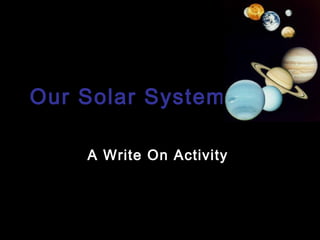
Our Solar System: A Guide to the Planets and Beyond
- 1. Our Solar System A Write On Activity
- 2. EARTH AND SPACE SCIENCE Tennessee Standard: Content Standard: 7.0 Earth and Its Place in the Universe The student will investigate the structure of the universe. Learning Expectations: 7.1 Recognize the basic components of the universe.
- 3. Our Solar System Our solar system is made up of: Sun Nine planets Their moons Asteroids Comets
- 4. Inner Planets The inner four rocky planets at the center of the solar system are: Mercury Venus Earth Mars
- 5. Mercury Planet nearest the sun Second smallest planet Covered with craters Has no moons or rings About size of Earth’s moon
- 6. Venus Sister planet to Earth Has no moons or rings Hot, thick atmosphere Brightest object in sky besides sun and moon (looks like bright star) Covered with craters, volcanoes, and mountains
- 7. Earth Third planet from sun Only planet known to have life and liquid water Atmosphere composed of composed of Nitrogen (78%), Oxygen (21%), and other gases (1%).
- 8. Mars Fourth planet from sun Appears as bright reddish color in the night sky Surface features volcanoes and huge dust storms Has 2 moons: Phobos and Deimos
- 9. Outer Planets The outer planets composed of gas are : Jupiter Saturn Uranus Neptune
- 10. Jupiter Largest planet in solar system Brightest planet in sky 60+ moons, 5 visible from Earth Strong magnetic field Giant red spot Rings have 3 parts: Halo Ring, Main Ring, Gossamer Ring
- 11. Saturn 6th planet from sun Beautiful set of rings 31 moons Largest moon, Titan, Easily visible in the night sky Voyager explored Saturn and its rings.
- 12. Uranus 7th planet from sun Has a faint ring system 27 known moons Covered with clouds Uranus sits on its side with the north and south poles sticking out the sides.
- 13. Neptune 8th planet from sun Discovered through math 7 known moons Triton largest moon Great Dark Spot thought to be a hole, similar to the hole in the ozone layer on Earth
- 14. Outermost Planet Pluto, the outermost planet, is a small solid icy planet is smaller than the Earth's Moon.
- 15. Pluto 9th planet from sun (usually) Never visited by spacecraft Orbits very slowly Moon, Charon, is very close to Pluto and about the same size
- 16. Asteroids Small bodies Believed to be left over from the beginning of the solar system billions of years ago 100,000 asteroids lie in belt between Mars and Jupiter Largest asteroids have been given names
- 17. Comets Small icy bodies Travel past the Sun Give off gas and dust as they pass by
- 18. Writing Activity Write a paragraph about the solar system. Include 5 facts covered in this presentation. Solar System Activities
- 19. Solar System Activities Order the Planets Fun with Planets Constellations of the Northern Sky Planets Solar System